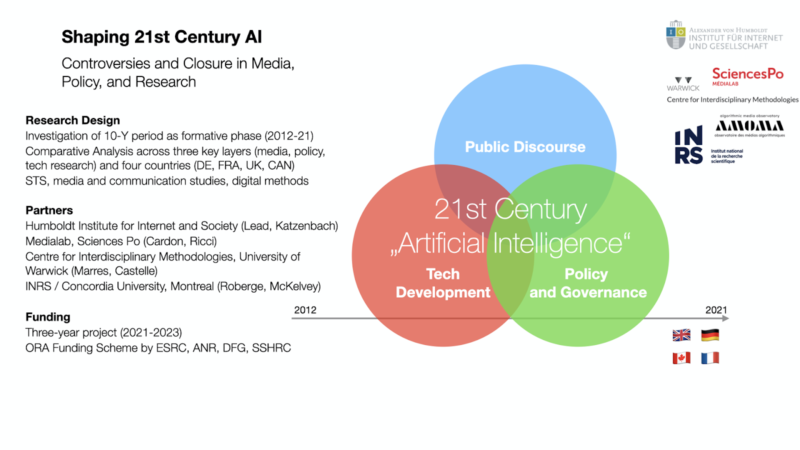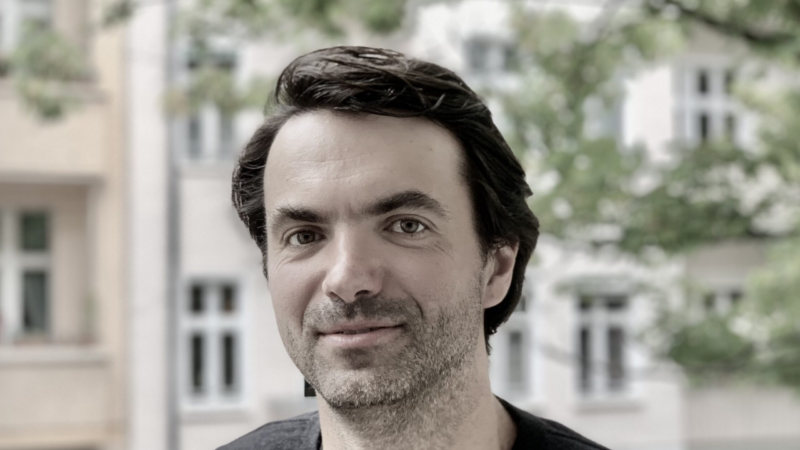
Shaping 21st Century AI – Controversies and Closure in Media, Policy, and Research
“Artificial Intelligence” (AI) is currently in its formative stage. Politicians, experts and start-up founders tell us that AI will change how we live, communicate, work and travel tomorrow. Autonomous vehicles, the detection of illnesses, automated filtering of misinformation and hate speech – AI is seemingly set out to fix fundamental problems of our societies. At the same time, substantive concerns are raised that these developments might reinforce social and economic inequality, exacerbate the opacity of decision-making processes, and ultimately question human autonomy. Moreover, the direction of the scientific field itself is up for dispute, with leading practitioners of machine learning publicly disagreeing about the long-term importance of different approaches to designing and training these artificial agents.
This conjunction of dynamic technological developments, fundamental controversies and massive investments sets the scene for the project Shaping AI. This multinational collaboration of partners in Germany, France, UK and Canada offers a comparative, longitudinal inquiry into how AI as a sociotechnical phenomenon is being integrated into our societies.

The project employs diverse sets of methods, including historical, ethnographic, and computational methods and the Media Lab’s cartographie de controverses, to investigate the discourse and developments around AI’s “deep learning revolution” over the ten formative years from 2012 to 2021 in the four partner countries and across three key domains. The media analysis investigates AI debates in major news outlets, niche websites and social media conversation. The policy analysis maps and analyze the existing policy initiatives, whitepapers and regulations in each country. The research analysis maps publication archives and scientific communities and experiments with ethnographic embedding in relevant workshops and conferences where AI intersects with social issues. In addition, the project investigates and instigates formats of public engagement by hosting participatory workshops that enable stakeholders and members of the public to debate and negotiate AI pathways.
This particular research design allows the project to retrace how 21st-century AI has been repeatedly constructed as both a problem and a solution: how throughout its brief history and unknown future, AI cultures negotiate across controversies and (apparent) closure without the scope of “AI” ever being fully defined.This international, comparative, multi-methodological study with a clear commitment to public knowledge and engagement seeks to extend and redistribute the range of expertise that is relevant to ensure that the coming of AI is truly for the greater good.
Shaping AI is a multinational collaboration by the Humboldt Institute of Internet and Society, Berlin, the medialab at Sciences Po, Paris, the Centre for Interdisciplinary Methods at the University of Warwick, and the NENIC Lab at INRS Montreal, and the Algorithmic Media Observatory at Concordia University. The collaborators won a 1,7 Mio € grant awarded by the partners’ national research foundations in the highly competitive Open-Research-Area (ORA) scheme.
The project builds on previous and ongoing work at the HIIG in this space such as the discursive and political construction of AI and the research program on the Evolving Digital Society.
| Duration | 02/2021 – 01/2024 |
| Funding | Förderlinie Open-Research-Area (ORA) von DFG, ANR, ESRC, SSHRC |
| Partners | Medialab at Sciences Po, Paris, the Centre for Interdisciplinary Methods (CIM) at the University of Warwick, and the NENIC Lab at INRS Montreal, and the Algorithmic Media Observatory at Concordia University |
SHIFTING AI CONTROVERSIES
At the international conference "Shifting AI Controversies" we explore the interventions we need to move towards society-centred AI.
 Christian Katzenbach, Prof. Dr.Associated researcher: The evolving digital society
Christian Katzenbach, Prof. Dr.Associated researcher: The evolving digital society Lena Marie HenkesResearcher: Knowledge & Society
Lena Marie HenkesResearcher: Knowledge & Society
-
 Anna Jobin, Dr.Associated Researcher: The Evolving Digital Society
Anna Jobin, Dr.Associated Researcher: The Evolving Digital Society -
 Fabian SofskyFormer Associated Researcher: The Evolving Digital Society
Fabian SofskyFormer Associated Researcher: The Evolving Digital Society -
 Laura LiebigFormer associated Researcher: The evolving digital society
Laura LiebigFormer associated Researcher: The evolving digital society -
 Lea TiyavorabunFormer Student assistant: The Evolving Digital Society
Lea TiyavorabunFormer Student assistant: The Evolving Digital Society -
 Licinia GüttelFormer associated Researcher: The Evolving Digital Society
Licinia GüttelFormer associated Researcher: The Evolving Digital Society -
 Oke SeligerFormer Student assistant: The Evolving Digital Society
Oke SeligerFormer Student assistant: The Evolving Digital Society
Journal articles and conference proceedings
Katzenbach, C., Pentzold, C., & Otero, P. V. (2024). Smoothing Out Smart Tech’s Rough Edges: Imperfect Automation and the Human Fix. Human-Machine Communication, 7(2), 23-43. DOI: 10.30658/hmc.7.2 Publication details
Hepp, A., Loosen, W., Dreyer, S., Jarke, J., Kannengießer, S., Katzenbach, C., Malaka, R., Pfadenhauer, M., Puschmann, C., & Schulz, W. (2022). Von der Mensch-Maschine-Interaktion zur kommunikativen KI. Publizistik, 67(4), 449–474. DOI: 10.1007/s11616-022-00758-4 Publication details
Liebig, L., Güttel, L., Jobin, A., & Katzenbach, C. (2022). Subnational AI policy: shaping AI in a multi-level governance system. AI & Society. DOI: https://doi.org/10.1007/s00146-022-01561-5 Publication details
Katzenbach, C. (2021). “AI will fix this” – The Technical, Discursive, and Political Turn to AI in Governing Communication. Big Data & Society, 8(2). DOI: 10.1177/2053951721104618 Publication details
Book contributions and chapters
Jobin, A. & Katzenbach, C. (2023). The Becoming of AI: A Critical Perspective on the Contingent Formation of AI. In Lindgren, S. (Eds.), Handbook of Critical Studies of Artificial Intelligence (pp. 43-55). Cheltenham, United Kingdom: Edward Elgar Publishing Ltd. DOI: 978 1 80392 855 5 Publication details
Scheibner, J., Jobin, A., & Vayena, E. (2022). Internet of Things Devices, Citizen Science Research and the Right to Science: Ethical and Legal Issues. In M. Ienca, O. Pollicino, L. Liguori, E. Stefanini, & R. Andorno, The Cambridge Handbook of Information Technology, Life Sciences and Human Rights (pp. 231-243). Cambridge: Cambridge University Press. DOI: 10.1017/9781108775038 Publication details
Working paper
Jobin, A., Guettel, L., Liebig, L., & Katzenbach, C. (2021). AI Federalism: shaping AI policy within states in Germany. arXiv. Publication details
Other publications
Fecher, B., Gümüsay, A. A., Bohn, S. & A. Jobin (2023). Resilience without accountability holds back transformative change. LSE Impact Blog. Publication details
Kopps, A., & Katzenbach, C. (2022). Turning back time for Content Moderation? How Musk’s takeover is affecting Twitter’s rules. Digital society blog. Publication details
Liebig, L., & Jobin, A. (2022). Artificial Intelligence made in X: die deutsche KI-Policy-Landschaft. Digital society blog. Publication details
Lectures and presentations
Military AI and human augmentation: On the shifting boundaries between super weapons and super soldiersShifting AI Controversies – Prompts, Provocations & Problematisations for Society-Centered A (Session: Imaginaries of AI). Humboldt Institute for Internet and Society. Berlin Social Science Center (WZB), Berlin, Germany: 29.01.2024 Further information
Thomas Christian Bächle
Negotiating AI Imaginaries across local realities andcultural differences in Germany, the US, and ChinaConference: Shifting AI Controversies – Prompts, Provocations & Problematisations for Society-Centered AI. Alexander von Humboldt Institute for Internet and Society. Berlin Social Science Center (WZB), Berlin, Germany: 29.01.2024 Further information
Christian Katzenbach
The sociotechnicity of AIDifussion #101. Center for Digital Society, Goethe-Institut Indonesia. Center for Digital Society, Gadjah Mada University, Yogyakarta, Indonesia: 09.10.2023
Anna Jobin
Shifting AI Controversies. Humboldt Institut für Internet und Gesellschaft, Berlin, Germany: 05.10.2023 Further informationLaura Liebig
AI Federalism: How Subnational Policy Tackles a ‘Global’ TechnologyIAMCR - Communication Research in the Era of Neo-Globalisation: Reorientations, Challenges and Changing Contexts. International Association for Media and Communication Research (IAMCR). Online, Beijing, China: 11.07.2022 Further information
Laura Liebig, Anna Jobin, Licina Güttel, Christian Katzenbach
Ethics and Epistemology for Artificial Intelligence and Machine BehaviorFrontiers Symposium: 12. Brazilian-German Frontiers of Science and Technology Symposium. Alexander von Humboldt Foundation. Maceió Atlantico, Maceió, Brazil: 02.07.2022 Further information
Anna Jobin
Communicating AI Policy: How Technology Comes to Matter in MediaAnnual ICA Conference: 72nd Annual ICA Conference: One World, One Network‽ (Session: Communicating AI: Shaping Artificial Intelligence in Policy, Research and Media). International Communication Association. Hyatt Regency Paris Étoile, Le Palais des Congrès de Paris, Le Méridien Etoile, Paris, France: 30.05.2022 Further information
Anna Jobin, Laura Liebig, Christian Katzenbach
Intelligent machines in a fluid world: Deconstructing metaphors in Japanese AI policyArtificial Intelligence and the Human Cross-Cultural Perspectives on Science and Fiction (Session: The Languages of AI). Humboldt Institute for Internet and Society, Japanese-German Center Berlin. Japanese-German Center Berlin, Berlin, Germany: 12.05.2022 Further information
Maurice Jones
Shaping AI – Imaginaries and Controversies of AI in Media and PolicyArtificial Intelligence and the Human Cross-Cultural Perspectives on Science and Fiction (Session: Imagining AI & the Human). Humboldt Institute for Internet and Society, Japanese-German Center Berlin. Japanese-German Center Berlin, Berlin, Germany: 12.05.2022 Further information
Christian Katzenbach, Vanessa Richter, Anna Jobin, Laura Liebig
Challenges in governing AI - evidence from soft lawInvited Talk. AI Lund, ADM Nordic. Online, Lund, Sweden: 15.12.2021 Further information
Anna Jobin
Targeted: Digital Communication and AdvertisingPanel: Communication and Ad-Financed Media. University of Leipzig. University of Leipzig, Leipzig, Germany: 12.11.2021
Anna Jobin
AI federalism: shaping AI policy within statesDigital Democracy Workshop (Session: Governance, Regulation, and Public Policy). Democracy Community of the Digital Society Initiative, Digital Democracy Lab at the University of Zurich. University of Zurich, Zurich, Switzerland: 28.10.2021 Further information
Licinia Gütel, Anna Jobin
Panels
[un]Stable Diffusions Symposium. Concordia University. Concordia University, Montréal, Canada: 23.05.2023 Further informationChristian Katzenbach, Laura Liebig
Moderation of workshops and panels
AI in Media and NewsShifting AI Controversies – Prompts, Provocations & Problematisations for Society-Centered AI. Humboldt Institute for Internet and Society. Berlin Social Science Center (WZB), Berlin, Germany: 30.01.2024 Further information
Laura Liebig
Shifting AI Controversies. Humboldt Institut für Internet und Gesellschaft, Berlin, Germany: 05.10.2023 Further informationChristian Katzenbach, Lena Henkes, Laura Liebig
Organisation of events
Shifting AI Controversies – Prompts, Provocations & Problematisations for Society-Centered AIFrom 29.01.2024 to 30.01.2024. Berlin Social Science Center (WZB), Berlin, Germany (International) Further information
Lena Marie Henkes, Christian Katzenbach
Not my Existential Risk! The politics of controversy in an age of AI29.01.2024. Museum of Communication Berlin, Berlin, Germany (International) Further information
Lena Marie Henkes
Shifting AI Controversies05.10.2023. Humboldt Institut für Internet und Gesellschaft, Berlin, Germany (National) Further information
Laura Liebig, Lena Marie Henkes, Christian Katzenbach
Digitaler Salon: KI – Die Letzte räumt das Internet auf31.03.2021. Livestream, Berlin, Deutschland (National) Further information
Natasha Vukajlovic, Philip Meier, Christian Grauvogel

